U.S. crude settled up $1 at $75.88 per barrel on Thursday as strong U.S. economic data bolstered crude markets but focus remained on whether OPEC will cut enough output to end a five-month long sell-off when it meets next week.
Factory activity in the U.S. mid-Atlantic region grew at its fastest pace in two decades, U.S. home resales jumped to their highest in more than a year in October, and a gauge of future U.S. economic activity gained more than expected last month. The data offset growth worries in the euro zone and China.
On the OPEC front, chances have risen in recent days that the Organization of the Petroleum Exporting Countries will agree on reducing production when it meets Nov. 27, said analysts, citing meetings between group members.
Read MoreThe big, immediate threat for a foreign oil giant
oil was up $1.26 at $79.36 a barrel by 2:30 p.m. EDT.

Oil traders said a Tweet earlier on Thursday from an account apparently held by Saudi Arabia's King Abdullah had briefly boosted the market. According to the message, the monarch said he had an "important phone conversation" with Iranian President Hassan Rouhani, suggesting increased OPEC dialogue. A source in the Gulf later said the Twitter account was fake.
"The market seems to be riding the wave of the strong U.S. data. There's also growing speculation that OPEC may do something to support prices," said Phil Flynn, analyst at Price Futures Group in Chicago.
OPEC members Iran, Venezuela and Libya have urged fellow crude producers to support oil prices, which are down 30 percent from June to four-year lows. Kuwait and Iran have said a cut is unlikely.
Read MoreUS shale and OPEC oil: Game of chicken?
Austrian consultancy JBC Energy said it expects OPEC to reduce at least 1 million barrels per day to clear some of the inventory overhang.
"If anything, the cut could be bigger," it said in a note.
New York-based consultancy Eurasia Group is pessimistic about a cut.
"It is increasingly likely that an agreement on a 'headline' production cut will not materialize, despite the current flurry of pre-meeting diplomacy," it said.

